|
|
|
Sort Order |
|
|
|
Items / Page
|
|
|
|
|
|
|
| Srl | Item |
| 1 |
ID:
147749
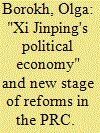

|
|
|
|
|
| Summary/Abstract |
The author examines the formation process and the essence of the concept of the "Xi Jinping's political economy," which became widespread at the end of 2015. Chinese interpretations of this concept are analyzed and the most significant theoretical innovations are singled out. Special attention is paid to the transformation of foreign concept and their adaptation in the system of "political economy of Chinese socialism."
|
|
|
|
|
|
|
|
|
|
|
|
|
|
|
|
| 2 |
ID:
138128


|
|
|
|
|
| Summary/Abstract |
In November 2012, soon after the conclusion of the 18th National Congress of the Communist Party of China (CPC), President Xi Jinping put forward for the first time the idea of the ‘Chinese Dream’. In March 2013, Xi further elaborated on this concept at the closing ceremony of the First Session of the 12th National People’s Congress. Xi’s concept of the Chinese Dream involves better education, more stable employment, higher incomes, a greater degree of social security, better medical and health care, improved housing conditions, a better environment, satisfactory jobs and better lives for the Chinese people. In foreign affairs, Xi emphasised that the Chinese Dream stands for peace, development, cooperation and mutual benefit for all. These are all unexceptional sentiments that could have been expressed by any national leader and thus few would disagree with Xi’s laudable thoughts. But what is the position on the ground and how is China faring under Xi Jinping’s rule in the achievement of these goals?
|
|
|
|
|
|
|
|
|
|
|
|
|
|
|
|
| 3 |
ID:
153206
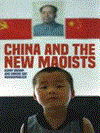

|
|
|
|
|
| Publication |
London, Zed Books, 2016.
|
| Description |
ix, 190p.pbk
|
| Standard Number |
9781783607594
|
|
|
|
|
|
|
|
|
|
|
|
Copies: C:1/I:0,R:0,Q:0
Circulation
| Accession# | Call# | Current Location | Status | Policy | Location |
| 059101 | 363.32517/BRO 059101 | Main | On Shelf | General | |
|
|
|
|
| 4 |
ID:
162353
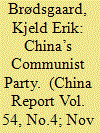

|
|
|
|
|
| Summary/Abstract |
The Communist Party of China (CPC) is not withering away as predicted by some Western scholars. On the contrary, in recent years, the party has centralised and strengthened its rule over China. At the same time, party membership has changed. Today, workers and farmers only account for only one-third of the total party membership compared to two-thirds when the People’s Republic of China (PRC) was established. Instead, new strata and groups such as technical and management personnel have evolved. The composition of the party’s cadre corps has changed accordingly, and cadres today are younger and much better educated than during Mao’s time. The leading cadres form an elite which is at the heart of a ranking-stratified political and social system. This article discusses how the CPC has evolved from a mass to an elite party. It argues that in this process, the party has taken over the state resulting in a merger and overlap of party and government positions and functions, thereby abandoning Deng Xiaoping’s ambidextrous policy goals of separating party and government. Centralisation and reassertion of ranking-stratified party rule is Xi Jinping’s answer to the huge challenges caused by the economic and social transformation of Chinese society—not a return to Mao’s mass party.
|
|
|
|
|
|
|
|
|
|
|
|
|
|
|
|
| 5 |
ID:
142357
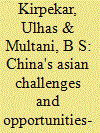

|
|
|
| 6 |
ID:
057904
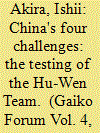

|
|
|
| 7 |
ID:
058298
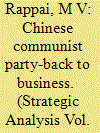

|
|
|
| 8 |
ID:
126383
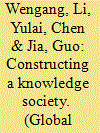

|
|
|
| 9 |
ID:
172265
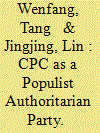

|
|
|
|
|
| Summary/Abstract |
This study examines the political attitude and behaviour of the rank-and-file members of the Communist Party of China (CPC). It compares five generations of Party members that carry distinctive memories during their political socialisation, and the findings show a significant decline in Party identity among the younger members. The empirical evidence, drawn from five national surveys of 11,989 respondents including 1,607 Party members, also suggests that the CPC has moved towards the trend of a populist authoritarian party.
|
|
|
|
|
|
|
|
|
|
|
|
|
|
|
|
| 10 |
ID:
143125
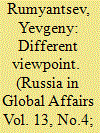

|
|
|
|
|
| Summary/Abstract |
On 3 September 2014, China for the first time celebrated a new national holiday -Victory Day in the Chinese People's War of Resistance against Japanese Aggression. The holiday was established on 27 February 2014 by the 12th Session of the Permanent Committee of the National People's Congress. At the same time, the People's Congress designated December 13 as National Memorial Day for the Nanjing Massacre Victims. The official purpose of the new holidays is to "engrave those events in the national memory of the Chinese people and make them a source of strength for the great rejuvenation of the Chinese nation." Chinese media report that celebrating the victory in the anti-Japanese war will "inspire China to show more initiative in international cooperation, invigorate its worldwide activities, and assume greater responsibility and obligations in the world community."
|
|
|
|
|
|
|
|
|
|
|
|
|
|
|
|
| 11 |
ID:
107974
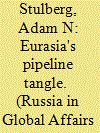

|
|
|
| 12 |
ID:
137500
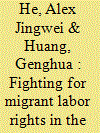

|
|
|
|
|
| Summary/Abstract |
China's dizzying economic achievement is not mirrored in its labor rights protection record. Migrant workers in particular do not enjoy rights commensurate with their contribution to the economy. The pervasive infringement of labor rights and the failure of the official protective system have jointly created a niche for nongovernmental organizations (NGOs). This article investigates the grassroots migrant labor NGOs in the Pearl River Delta region, an area which has seen unprecedented increases in labor disputes both in terms of quantity and intensity. Making extensive use of in-depth interviews and participatory observations, it examines the strategies and tactics NGOs use for survival and growth in a hostile external environment. This article reveals that administrative illegitimacy and resource shortage have been the two key challenges for grassroots NGOs; in order to survive, they have developed a series of strategies to enhance legitimacy and explore resources. In the meantime, however, antagonistic thinking still drives the government's response to grassroots organizations unless the latter can skillfully balance political ideology and actual operation. Yet, overall, most NGOs still managed to survive despite various difficulties. Reciprocity and mutual trust are of critical importance to peaceful coexistence, if not cooperation, between the state and the grassroots. The building of long-term healthy labor relations in China necessitates more liberal thinking and collaborative governance.
|
|
|
|
|
|
|
|
|
|
|
|
|
|
|
|
| 13 |
ID:
124199
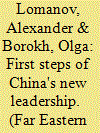

|
|
|
|
|
| Publication |
2013.
|
| Summary/Abstract |
This article is devoted to the new trends in China's policy after the 18th CPC Congress. The unveiling of the slogan "The Chinese Dream" of a "Great Rebirth of the Nation" opened up new prospects for consolidating society around the objectives of development. The Chinese leadership stresses the complicated nature of future reforms and the need to overcome the growing resistance to further changes.
|
|
|
|
|
|
|
|
|
|
|
|
|
|
|
|
| 14 |
ID:
161174
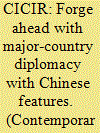

|
|
|
| 15 |
ID:
095190
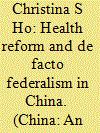

|
|
|
|
|
| Publication |
2010.
|
| Summary/Abstract |
Understanding China as a de facto federalism can generate explanations and recommendations concerning the path of China's health reform. The first section reviews how de facto federalism drove the historical development of the problems plaguing China's health system. The next section shows how certain features of the current reform plan, namely, the plan's ambivalence between government and market approaches and its lack of strong centralisation, can be explained by de facto federalism. The third section uses the hypothesis of de facto federalism to generate two courses of action - one cautionary; the other, aspirational - that could be considered for the future. The consequences for the health sector of under-articulated federalism are clarified and point to the need for discursive reasoned elaboration, as opposed to political bargaining alone, in federalism.
|
|
|
|
|
|
|
|
|
|
|
|
|
|
|
|
| 16 |
ID:
138450
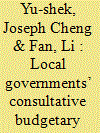

|
|
|
|
|
| Summary/Abstract |
The Chinese leadership is still reluctant to accept any reforms that are perceived to cause an erosion of the Communist Party of China’s monopoly of political power, although it is eager to improve governance, especially at the grassroots level. Participatory budgetary reforms as represented by the Wenling model are therefore perceived by some academics and local reformers as a channel through which breakthroughs in grassroots democracy in terms of public participation and government accountability can be achieved. Apparently this has gained some support from the top leadership—because some leaders are keen to reduce deficits and ensure budget transparency and accountability in local governments as well as at the top leadership—which now wants to combat corruption. Naturally, there is strong resistance because local governments are unwilling to limit their room for manoeuvre in terms of government expenditure and give up their control of extra-budgetary funds. While existing literature concentrates on the reform model and its rationale, this article offers a detailed empirical description of the actual reform processes at the local level. The Wenling consultative budgetary reforms were lauded and encouraged by Hu Jintao’s report to the 18th Party Congress on 8 November 2012. This offered the official support that the reformers needed, and provided the momentum they required to continue reforms and even promote them in other local governments. Of particular concern, however, is the intention of the Chinese leadership to incorporate this type of consultative mechanism into the framework of the Chinese People’s Political Consultative Conference; such a change would fall below the expectations of those who wish to secure breakthroughs in political participation.
|
|
|
|
|
|
|
|
|
|
|
|
|
|
|
|
| 17 |
ID:
138445
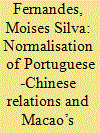

|
|
|
|
|
| Summary/Abstract |
Although many people believe that small or medium powers tend to be very concerned with overseas territories, this was not true in the case of Macao. The great power, mainland China, showed very little interest in foreign affairs, because it knew that the outcome of the handover would be in its favour. Nonetheless, from May 1974 to July 1975, both China and Portugal had to demarcate their positions. The Portuguese entered into informal conversations with the Chinese ambassador to France, Zeng Tao, in August 1975, which lasted until January 1978, a total of almost three years. As soon as power in mainland China shifted from the leftists to the moderates, however, the new ambassador in Paris, Han Kehua, made it clear that he wanted things settled in six months. However, in 1978, the Portuguese cabinet had three different prime ministers and three different ministers of foreign affairs. Ultimately, the Portuguese cabinet had to give in to mainland China, on 8 February 1979.
|
|
|
|
|
|
|
|
|
|
|
|
|
|
|
|
| 18 |
ID:
124995
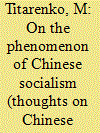

|
|
|
|
|
| Publication |
2013.
|
| Summary/Abstract |
Thoughts on the essence, features, and future of Chinese socialism are analyzed. The ongoing development and enrichment of the concept of socialism with a Chinese face as it applies to certain cultural and civilizational features of China and its socioeconomic and political structure are considered. The content of the scientific concept of development and its practical application are discussed. The great importance of the theory and practice of building socialism in China for the future of national rebirth and realizing humanity's dream of a fair and just society with universal prosperity is demonstrated.
|
|
|
|
|
|
|
|
|
|
|
|
|
|
|
|
| 19 |
ID:
167681
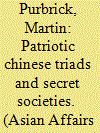

|
|
|
|
|
| Summary/Abstract |
Triad and other secret societies have been mutual aid groups, personal networks amongst Chinese, organised criminal gangs, as well as associated with patriotism. The perceived patriotism of triads originated in the support of some for the restoration of the Ming Dynasty and overthrow of the Manchu Qing dynasty. The association of triads with patriotism continued as triad and secret societies used regimes for advantage and regimes likewise used them when in need of support. The Nationalists (Kuomintang), the Communists, and even the British have worked with or used triad or other secret societies when the need has arisen. The pretext of patriotism is a central factor in the durability of triad and secret societies in China. This article seeks to explain the frequent association of triad societies with patriotism and why this has contributed to the durability of the criminality of triads that overlooks their long-term criminality.
|
|
|
|
|
|
|
|
|
|
|
|
|
|
|
|
| 20 |
ID:
137463
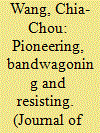

|
|
|
|
|
| Summary/Abstract |
This study determined the preferred strategies of provincial leaders when policies formulated by the central government jeopardized provincial interests, and investigated the extent to which these preferred strategies were reflected in actual actions. The theoretical preferred strategies were ascertained using rational choice institutionalism as a research approach, and an analytic framework was developed comprising three dimensions: (a) provincial government predictions of central government actions; (b) the terms of office of CPC provincial committee secretaries; and (c) the connections between CPC provincial committee secretaries and Hu Jintao. The results showed that the accuracy rate of the research framework to predict the actual actions of provinces was 54.8%. Using the proposed analytic framework can reduce prediction errors by 28.1%.
|
|
|
|
|
|
|
|
|
|
|
|
|
|
|
|
|
|
|
|
|